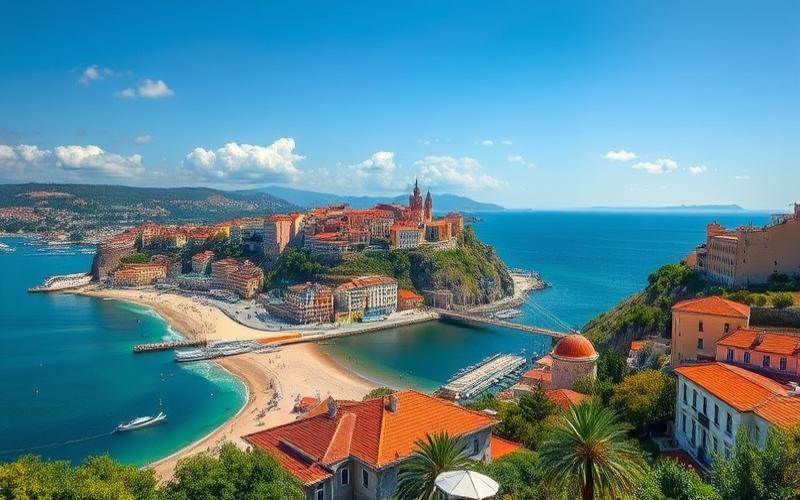
 Published on and written by Cyril Jarnias
Published on and written by Cyril Jarnias
Portugal’s appeal to expatriates continues to grow, and for good reason: between its Mediterranean climate, quality of life, and advantageous tax regime, the Lusitanian country has much to offer. However, understanding the tax system of a new country can be complex. This article will guide you through the intricacies of the Portuguese tax system, focusing on the most relevant aspects for expatriates in 2025.
The Portuguese Tax System: A Labyrinth to Demystify
Portugal has a relatively complex tax system, but it can prove advantageous for expatriates, particularly through certain special regimes. Let’s dive into the main components of this system.
Income Tax (IRS): The Heart of the System
Personal income tax, called IRS (Imposto sobre o Rendimento das Pessoas Singulares) in Portugal, is the backbone of the tax system. It applies to all worldwide income of Portuguese tax residents, while non-residents are only taxed on their Portuguese-source income.
The IRS brackets for 2025 consist of several tiers, with rates ranging from 14.5% to 48% for the highest incomes. It’s important to note that these rates are progressive, meaning each income bracket is taxed at its corresponding rate.
VAT (IVA): Omnipresent but Variable
Value Added Tax, known as IVA (Imposto sobre o Valor Acrescentado) in Portugal, applies to most goods and services. The standard rate is 23% in 2025, but there are reduced rates of 13% and 6% for certain essential products and services.
Corporate Tax (IRC): For Expatriate Entrepreneurs
For expatriates considering starting a business in Portugal, corporate tax, or IRC (Imposto sobre o Rendimento das Pessoas Coletivas), is set at a base rate of 21% in 2025. However, reduced rates may apply for SMEs and in certain regions of the country.
Local Taxes: Don’t Overlook Them
In addition to these national taxes, there are various local taxes that expatriates need to consider. The most notable is IMI (Imposto Municipal sobre Imóveis), equivalent to property tax, with rates varying between 0.3% and 0.45% of the property’s assessed value in 2025.
Good to Know:
Portugal offers a complex but potentially advantageous tax system for expatriates. Income tax, VAT, corporate tax, and local taxes are the main components to understand. A good grasp of these elements is essential for optimizing your tax situation.
Tax Filing in Portugal: A Process to Master
Filing taxes in Portugal may seem intimidating for newcomers, but with the right information, it becomes much more manageable. Here’s what you need to know for 2025.
The Tax Calendar: Dates Not to Miss
In Portugal, the tax year corresponds to the calendar year. The income declaration period for 2025 (covering 2024 income) typically runs from April 1st to June 30th. It’s crucial to meet these deadlines to avoid penalties.
Online Filing: Simplicity and Efficiency
For several years now, Portugal has largely digitized its tax filing system. Most taxpayers must now submit their returns online via the Finanças portal. This system is not only faster but also allows for pre-filling certain information, thus simplifying the process.
Required Documents: Be Organized
To complete your return, you’ll need various documents, including:
- Your Portuguese tax identification number (NIF)
- Statements of all your income (salaries, pensions, rental income, etc.)
- Proof of your deductible expenses (healthcare, education, etc.)
- Certificates of your financial investments
Specifics for Expatriates: Attention to Foreign Income
As an expatriate, you’ll likely need to declare foreign-source income. It’s essential to understand how this income is treated tax-wise in Portugal, particularly regarding bilateral tax treaties that may apply to avoid double taxation.
Good to Know:
Tax filing in Portugal is primarily done online, with a submission period from April to June. Expatriates must be particularly attentive to declaring their foreign income and applicable tax treaties. Good organization and gathering all necessary documents in advance greatly facilitate the process.
Golden Tips for Expatriates: Optimize Your Tax Situation
Navigating the tax system of a new country can be complex, but with the right advice, you can not only avoid pitfalls but also make the most of your tax situation in Portugal.
The Non-Habitual Resident (NHR) Regime: An Opportunity to Seize
Although the NHR regime underwent changes in 2024, it remains an interesting option for many expatriates. This status, granted for a 10-year period, offers significant tax benefits, including a fixed 20% tax rate on certain professional income and favorable treatment for certain foreign income.
- Not having been a tax resident in Portugal during the five preceding years
- Becoming a Portuguese tax resident
- Engaging in a “high value-added” activity according to the government’s established list
Tax Planning: Anticipate to Optimize
Good tax planning can make a significant difference. Consider the following points:
- Assess the tax impact of your investments, both in Portugal and in your home country
- Explore Portuguese retirement savings options, which can offer tax advantages
- If you’re considering buying property, compare the tax implications of renting versus buying
Stay Informed About Legislative Changes
Tax legislation evolves regularly. In 2025, stay alert for potential changes, particularly concerning:
- IRS tax rates and brackets
- Available tax deductions
- International tax agreements
Get Professional Assistance
Given the complexity of the Portuguese tax system and the specifics related to expatriate status, it’s often wise to consult an accountant or tax lawyer familiar with international situations. This investment can prove cost-effective in the long run by helping you optimize your tax situation and avoid costly mistakes.
Good to Know:
The NHR regime remains a major asset for expatriates in Portugal in 2025, despite some modifications. Careful tax planning, regular monitoring of legislative changes, and consulting professionals can greatly optimize your tax situation. Don’t hesitate to invest time and resources in these aspects to maximize the benefits of your expatriation to Portugal.
Conclusion: Portugal, A Tax Haven for Expatriates?
The Portuguese tax system, although complex, offers real opportunities for expatriates in 2025. With its competitive tax rates, attractive NHR regime, and recognized quality of life, Portugal continues to attract many foreigners seeking to optimize their tax situation while enjoying a pleasant living environment.
However, it’s crucial not to be blinded by tax benefits alone. A successful expatriation requires a comprehensive approach, taking into account not only financial aspects but also personal and professional considerations.
Ultimately, a good understanding of the Portuguese tax system, coupled with careful planning and wise professional advice, will allow you to make the most of your expatriation to Portugal. Whether you’re drawn to the beaches of the Algarve, the dynamism of Lisbon, or the rustic charm of the interior, Portugal has much to offer, both in terms of taxation and quality of life.
Remember that taxation is just one aspect of your new life in Portugal. Fully enjoy this unique experience, immerse yourself in the local culture, learn the language, and build lasting connections. It’s the combination of all these elements that will make your expatriation to Portugal a truly enriching adventure.
Disclaimer: The information provided on this website is for informational purposes only and does not constitute financial, legal, or professional advice. We encourage you to consult qualified experts before making any investment, real estate, or expatriation decisions. Although we strive to maintain up-to-date and accurate information, we do not guarantee the completeness, accuracy, or timeliness of the proposed content. As investment and expatriation involve risks, we disclaim any liability for potential losses or damages arising from the use of this site. Your use of this site confirms your acceptance of these terms and your understanding of the associated risks.




























